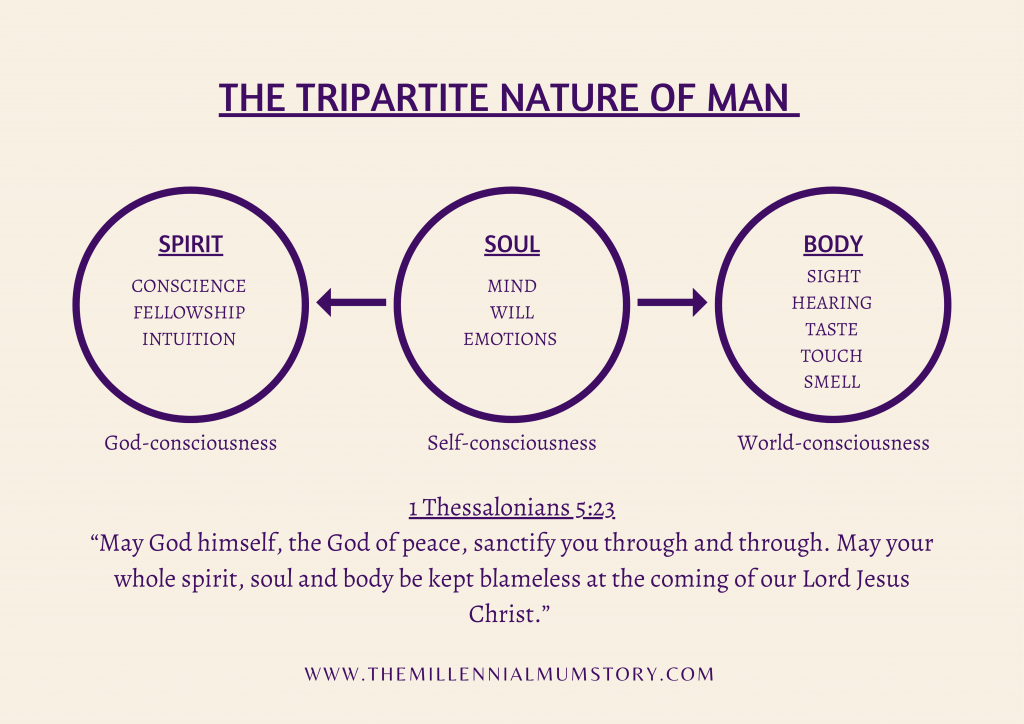
Do not be anxious about anything, but in everything by prayer and supplication with thanksgiving let your requests be made known to God. And the peace of God, which surpasses all understanding, will guard your hearts and your minds in Christ Jesus (Philippians 4:6-7)
There’s this very commonly known verse in the Bible that says, “I will praise You, for I am fearfully and wonderfully made; marvelous are Your works, and that my soul knows very well” (Psalm 139:14). I particularly love the New Living Translation Version which states “Thank you for making me so wonderfully complex! Your workmanship is marvelous—how well I know it.” This complexity allows us to have varied experiences, personalities, temperaments, physiques, and many other things. Another thing that makes us even more complex is what makes up who and what we are—specifically, the trinity of the body, soul, and mind. In Christian theology, it’s called the tripartite nature of man. Because of how woven together we are, these three aspects of our being rely on each other to create either harmony or dysfunction depending on how well they work together.
One aspect of life that depends mainly on the interworking of this trinity is peace. Biblically, peace isn’t just the absence of war but something much deeper than that. ‘Shalom,’ a word used to mean peace refers to a state of wholeness or completeness, lacking nothing. Therefore, peace is more about the presence of something than the absence of it. If peace is about completeness, it would only be fair to believe that it’s not just about some spiritual or imaginary but also physical and visible. In this way, it affects not just our inner being but the external as well – the Spirit, soul and body. This is proven in scripture in 1 Thessalonians 5:23 which says, “May God himself, the God of peace, sanctify you through and through. May your whole spirit, soul, and body be kept blameless at the coming of our Lord Jesus Christ.” God is interested in His peace being ours in every part of our existence.
The spirit: The hope of eternity (Titus 1:2)
This one is probably the least physically felt part of your being. It’s the one that relies on the power of the Holy Spirit to experience it truly. This part of us is either fallen when we live in sin or completely renewed when we accept Jesus into our lives. In sin, we live according to the flesh and whatever it desires. But when we get saved, the Holy Spirit, the same One that was in Jesus when He walked on earth, lives in us, and we’re strengthened to do what pleases God even when our flesh doesn’t want to (Romans 6:10-11).
Because we have the Holy Spirit in us, He manifests His presence in what the Bible calls the ‘fruits of the Holy Spirit’ (Galatians 5:22-23). One of these fruits is peace. The only way we get healthy is by caring for our bodies in the same way that we can only experience this kind of peace by the indwelling of the Holy Spirit. Any other type of peace, worldly peace, may be a quick fix but isn’t nearly as fulfilling or lasting as that of Christ. He mentioned this when He said, “I am leaving you with a gift—peace of mind and heart. And the peace I give is a gift the world cannot give. So don’t be troubled or afraid” (John 14:27).
The result is that the three parts of our spirit are renewed – our conscience keeps us aware of making the right decisions over wrongs ones (Ephesians 3:16), our fellowship with God is restored and we can be in communion with Him again (Ephesians 2:14-18), and our intuition is settled in the knowledge that we’re in right standing with God (Romans 8:38-39).
The body: Calm in the storm (Mark 4:35-41)
This part of us needs no introduction because it is what we’re usually most adapted to. Our bodies are made up of the five senses and therefore operate based on the environment around us. In many ways, our humanity encapsulated in our bodily form best expresses the frailty of our existence. Dangers such as sickness and natural disasters threaten our lives, such that it’s a wonder how far we’ve survived since the beginning of the human race. However, God validates our humanity even in our frailty because it reflects who He is. 1 Corinthians 6:19-20 describes our body as the ‘temple of the Holy Spirit,’ and Philippians 1:20 says, ‘ Christ will be exalted in [our bodies].’
The Bible emphasizes that we should care for our bodies. 1 Corinthians 6:19-20 says, “Do you not know that your bodies are temples of the Holy Spirit, who is in you, whom you have received from God? You are not your own; you were bought at a price. Therefore, honor God with your bodies.” Just like a well-preserved home is a reflection of a responsible owner, because we’re the temple of the Holy Spirit, our bodies must reflect God’s nature. God validates the significance of our bodies. Therefore, as He offers us peace, it is also for our bodies such that we can look at our environment and be at peace regardless of what’s happening.
Jesus gives us the perfect example for this in Mark 4:35-41 when He calms the storm. Verse 38 explains that a fierce storm suddenly erupted, and the next verse says, “Jesus was sleeping at the back of the boat.” Obviously, His disciples are panicking, calling to Him, and asking why He doesn’t seem to care that they could die. Jesus then wakes up, and all He says to the storm is, “Peace, be still!” The wind heard Him and died down. His peace was regardless of His circumstances. And this is the peace that God offers us when He says, “I have said these things to you, that in me you may have peace. In the world you will have tribulation. But take heart; I have overcome the world.” (John 16:33). God doesn’t take away challenging circumstances, but He says that we can be victorious over them through His victory.
The soul: The spirit versus the flesh (Romans 8:6-7)
The essence of our existence is what we call the soul. It comprises our will, mind, and emotions. This part of us survives after death and embodies who we are. The soul and spirit sound similar, but here is a distinction that I found helpful. When answering a question about the similarity of the spirit and soul, Colin Smith said, “Your soul speaks of your inner-life in relation to your own experience: your mind, heart, will, and imagination. It also includes your thoughts, desires, passions, and dreams. But your Spirit speaks of the same inner-life in relation to God: your faith, hope, love, character, and perseverance.” This distinction shows that the soul displays both the spiritual and physical aspects of man, making it the perfect bridge between these two realities as we can see here

Regarding peace, the soul will conform to the body/flesh or the spirit. James 1:23 lets us know that in the same way we look at our reflection of our physical selves in the mirror, the Bible reflects our spiritual selves. It shows us our weaknesses and flaws but also our power and redemption. When we’re unwell, and the doctor says there’s nothing more they can do, the Word of God says that by His stripes we were healed (Isaiah 53:5), we know that we have a higher truth that determines our reality. It is therefore a daily choice about which reflection you want to trust.
When it comes to our peace, it has already been made available through Christ (Ephesians 2:14-18). It is for us to feed our spirit to the point that the soul conforms to that truth. Romans 8:6-7 says, “The mind governed by the flesh is death, but the mind governed by the Spirit is life and peace. The mind governed by the flesh is hostile to God; it does not submit to God’s law, nor can it do so.” We have can train our mind through the power of the Holy Spirit to be in a state of peace even when our body knows otherwise.
Conclusion
The interconnectedness of our being is such that one part of us affects all of us. What we believe affects how we think and, eventually, how we act. The call to peace that God offers us comes from His Holy Spirit. The strengthening of our spirit is reflected in our soul and, ultimately, our body. Not to say that we should ignore our physical realities. Instead, the conviction of a greater truth bolsters our ability to look at physical realities as not being the final say in our lives. Romans 8:6-7 reminds us that the soul is the determinant concerning whether or not we live in peace or not. The scripture says, “The mind governed by the flesh is death, but the mind governed by the Spirit is life and peace. The mind governed by the flesh is hostile to God; it does not submit to God’s law, nor can it do so.” When our mind (part of the soul) isn’t looking to the spirit to find peace, it automatically looks to the flesh. It’s one or the other. Therefore, God says, “set your minds on things above, not on earthly things” by focusing on building our spirit rather than our flesh. When we’re aligned with God, our channel to Him is connected, and peace can flow right through it from our spirit to our soul and, eventually, to our body. Physical realities change all the time. Our mind also wavers. But our spirit is constant because God is constant. There is no foundation more sure for our peace than the one God offers that permeates our entire being. Choose it today!
Verse for the week
Romans 15:13
May the God of hope fill you with all joy and peace in believing, so that by the power of the Holy Spirit you may abound in hope
Hi i think that i saw you visited my web site thus i came to Return the favore I am attempting to find things to improve my web siteI suppose its ok to use some of your ideas
Keep up the fantastic work! Kalorifer Sobası odun, kömür, pelet gibi yakıtlarla çalışan ve ısıtma işlevi gören bir soba türüdür. Kalorifer Sobası içindeki yakıtın yanmasıyla oluşan ısıyı doğrudan çevresine yayar ve aynı zamanda suyun ısınmasını sağlar.
Good https://is.gd/tpjNyL
Obtain High is an ethics-first simulation of responsible psychoactive capitalism.